Let’s face it—choosing a mattress online is no easy task, and it’s even more difficult when trying to decide between major brands like Casper and Nectar.
Well, I’m here to make this an easy choice! In this Casper vs Nectar mattress comparison, I’ll discuss the similarities and differences between these two beds and explain who should choose each mattress.
Casper vs Nectar Side-by-Side
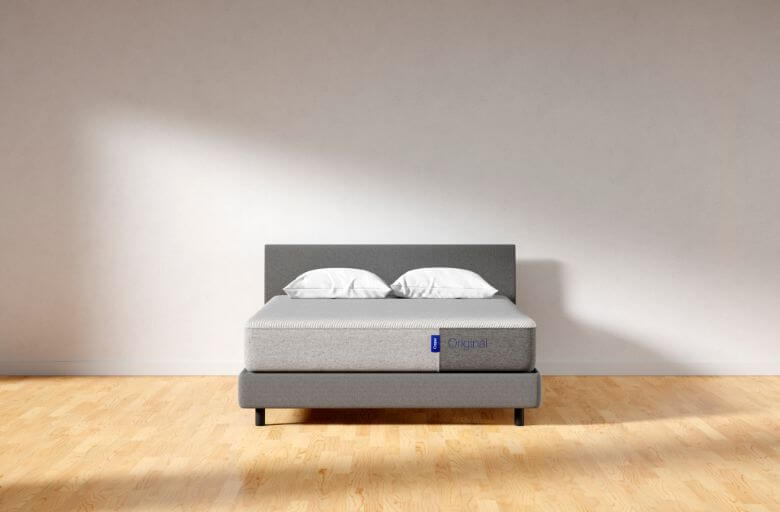
|
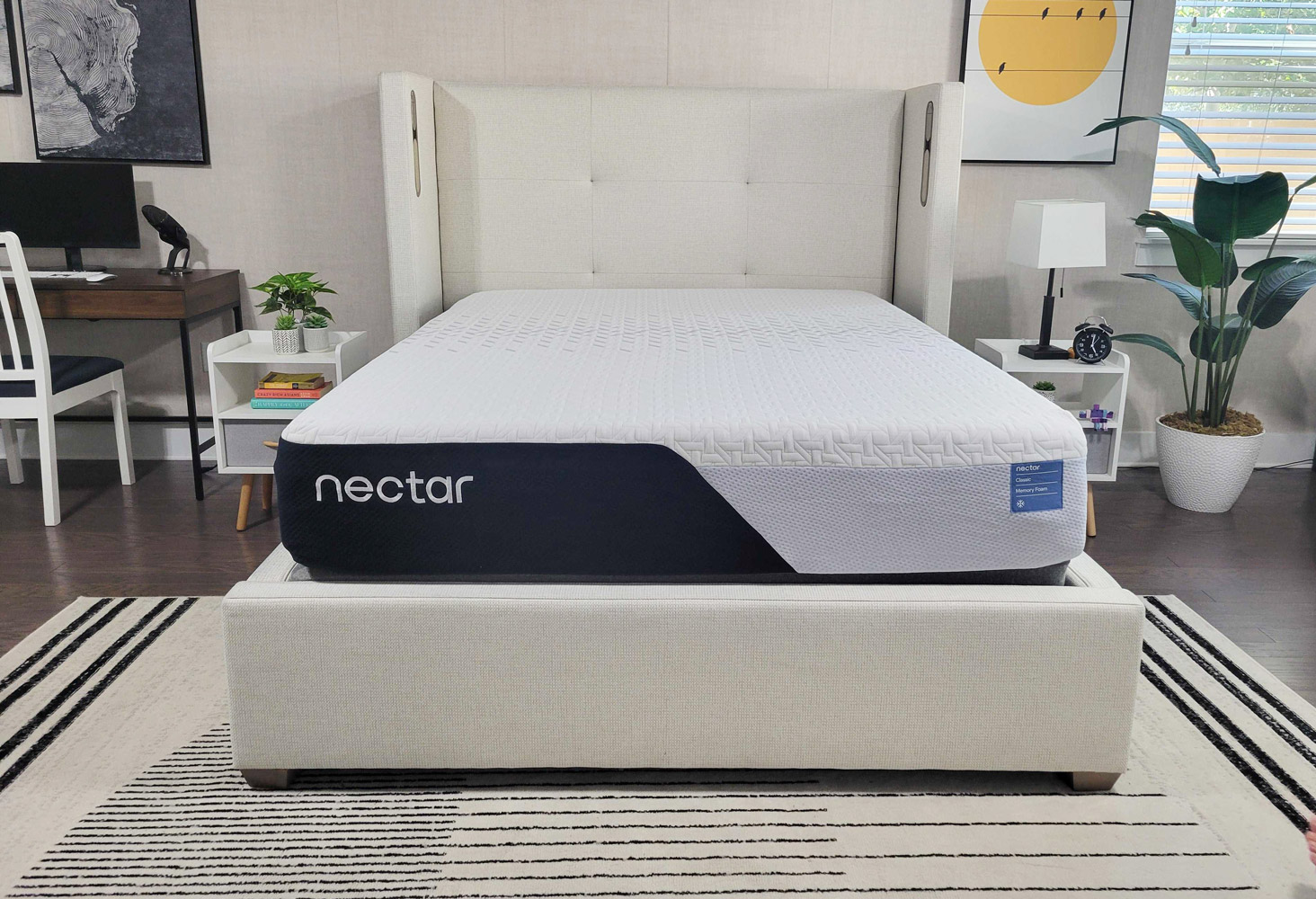
|
|
| Casper The One Mattress | Nectar Mattress | |
| Rating | ||
| Firmness | Medium-firm: 7/10 | Medium-firm: 7/10 |
| Material | Foam | Foam |
| Cooling | — | — |
| Best For |
Back Pain,
Seniors, Couples |
Side Sleepers,
Back Sleepers, Stomach Sleepers |
Casper vs Nectar Mattress Overview
Looking for the best mattress-in-a-box? Casper and Nectar are two of the most popular on the market, and for good reason. The Casper has a zoned support system that offers a unique balance of comfort and support, and the Nectar features some of the most comfortable memory foam we’ve ever tested.
While these are both high-quality mattresses, they are a better match for different types of sleepers:
| Who Should Choose the Casper Mattress? | Who Should Choose the Nectar Mattress? |
| Those searching for a bed for combination sleepers who move a lot at night. | Light and medium weight side sleepers who want to feel excellent pressure relief on their shoulders and hips |
| Those who prefer a balanced foam feel that makes it easy to move around | People who want to sink into a memory foam mattress |
| Back sleepers who are in need of extra support, especially those who are on the heavier side | Couples who want a mattress that isolates motion well |
Casper vs Nectar Mattress Video Comparison
To really see how the Casper and Nectar mattresses compare, check out our in-depth video review. I’ll take a look at their construction differences and discuss my experience with both beds.

Casper vs Nectar: Similarities and Differences
Let’s take a look at the similarities and differences between the Casper and Nectar mattresses in regards to construction, firmness, and feel.
| Similarities | Differences |
| The Casper and Nectar are both all-foam mattresses and do not contain coils. | The Casper has a zoned construction that makes the center of the mattress feel firmer than the head and foot. The Nectar has the same firmness level throughout. |
| The Casper and Nectar mattresses have similar support layers made out of high-density base foam. | The Casper mattress has more of a balanced foam feel, while the Nectar mattress has a slow-moving memory foam feel. |
| The Casper mattress and Nectar mattress are very close when it comes to their thickness and height. | The Nectar mattress is softer than the Casper mattress. |
| At regular price, these mattresses fall within the same price range. |
Firmness and Feel Differences
The Casper and Nectar mattresses are indeed different when it comes to firmness and feel; let’s discuss these differences in more detail.
How Firm Are the Casper and Nectar Mattresses?
In my experience, the Casper mattress felt like a 7/10, which is a bit firmer than average. The Nectar felt like a 6.5/10, about medium in terms of firmness. If you want a softer Nectar mattress, consider the Nectar Premier and Nectar Luxe mattresses.
These scores might differ depending on one’s size and weight, however. Larger people might feel like the Casper and Nectar are firmer than I did, and lighter people might find them both to be softer.
Product
Firmness
Score

Product
Firmness
Score
Sleeping on the Casper and Nectar Mattresses
When I slept on my back on the Casper mattress, I felt a great balance of comfort and support. My hips sank in just the right amount, but the high-density base layer prevented me from ‘bottoming out.’ I also felt extra lumbar support from the zoned construction, so it’s a great mattress if you deal with back pain.
While side sleeping, I felt some nice pressure relief on my shoulders and hips. The mattress felt softer near my shoulder, which helped alleviate pain and tension.
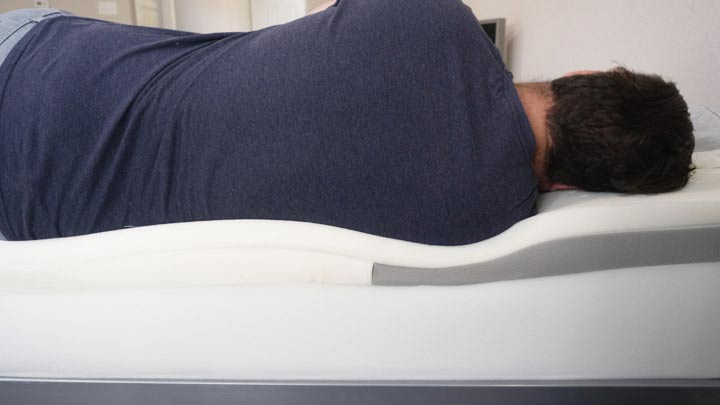
The Casper mattress offered decent hip support when I rested on my stomach, but it’s not quite firm enough to rest in this sleeping position all night long. As a heavier person, I compressed the top layers quite a bit. Over time, I would expect to develop some lower back pain in this sleeping position.
I felt plenty of lumbar support while back sleeping on the Nectar mattress. The memory foam cushioned my joints and gently conformed to my body. I felt more pressure relief when I rested on my side. The Nectar mattress’s thick comfort layer alleviated pain along my shoulders and hips.
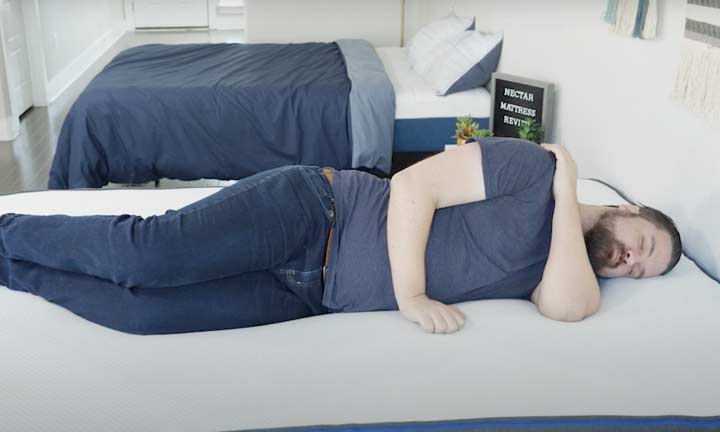
However, the Nectar mattress did not offer enough support while stomach sleeping. My hips sank out of alignment, and it put a lot of pressure on my lower back. If you’re a stomach sleeper, I would recommend sleeping on one of the best firm mattresses.
What Do the Casper and Nectar Mattresses Feel Like?
The Casper mattress has a balanced foam feel that is soft and also responsive. When I rested on the Casper mattress, I sank in a bit but I didn’t have trouble moving around on top of it.
The Nectar has a classic, slow-moving memory foam feel. I slowly sank into the mattress and felt the foam conform to my curves.
Average Weight Sleepers: 130 lb – 230 lb
Average weight back sleepers should feel a good balance of comfort and support when they rest on the Casper mattress, and they should feel some excellent lumbar support as well. Average weight side sleepers who are under 200 lb should get all the pressure relief they need, but those who are closer to 230 lb might need a softer mattress. The majority of average weight stomach sleepers should get enough support on the Casper mattress.
The majority of average weight back sleepers should also find the Nectar to be a good match–they will get enough support and should enjoy the way the memory foam conforms to their bodies. Average weight side sleepers should feel better pressure relief than they did on the Casper mattress, but those who are close to 230 lb might still require a softer mattress. Most average weight stomach sleepers will not get enough lumbar support from the Nectar mattress.
Heavyweight Sleepers: Over 230 lb
Back sleepers who are closer to 230 lb should get enough support from the Casper mattress; those who are over 230 lb will want to consider the Casper Hybrid or another mattress with coils. Heavyweight side sleepers might feel too much pressure on their shoulders and hips as they press far into the mattress. Stomach sleeping, heavier sleepers will probably need to find a more supportive mattress with coils.
Heavier back sleepers who are closer to 230 lb should get enough support from the Nectar, but those who are heavier will need a hybrid or innerspring mattress that offers more support. Side sleepers who weigh around 230 lb should feel nice pressure relief on the Nectar, but those who are larger might bottom out. Larger stomach sleepers are definitely going to require a firmer, more supportive mattress in order to maintain the proper spinal alignment.
Lightweight Sleepers: Under 130 lb
The Casper mattress is a great choice for lightweight sleepers. No matter the sleeping position, smaller people should feel the optimal amount of comfort and support.
The Nectar mattress is a good choice for lightweight back and side sleepers. The high-density base foam supports the spine, while the comfort layers cushion joints. Lightweight stomach sleepers may prefer the Casper mattress, because it feels a bit more supportive toward the center of the bed.
Mattress Construction Differences
Now, let’s look inside the Casper and Nectar mattresses and see what they’re made out of.
Cover
The Casper mattress features a soft, breathable, knit cover. It doesn’t affect the overall feel of the mattress too much, but it can help some sleepers stay cool at night.
The Nectar’s cover contains polyethylene, a breathable material that aids in cooling.
Comfort Layers
On top of the Casper, there is a layer of polyfoam that is soft and responsive. It also features AirScape technology, which helps promote airflow through the top of the mattress. Below that is the most notable feature of the Casper: a layer of memory foam with zoned support. This layer feels firmer toward the center of the mattress and softer towards the head and foot, which helps sleepers maintain the correct spinal alignment in many different sleeping positions.
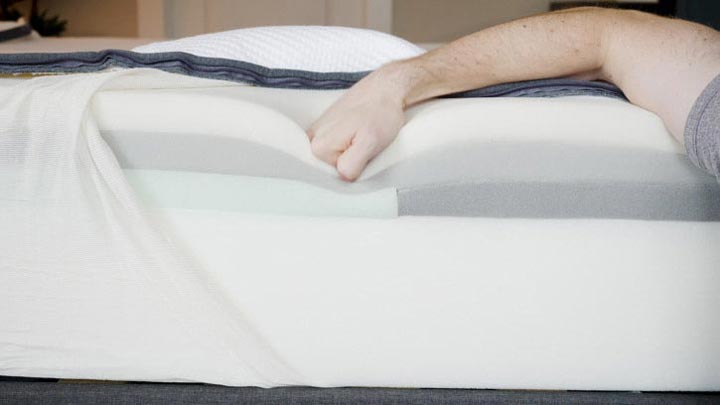
The top layer of the Nectar contains gel-infused memory foam, which feels slow-moving and cool. Then, there’s a layer of transition foam that adds some more body contouring and support.
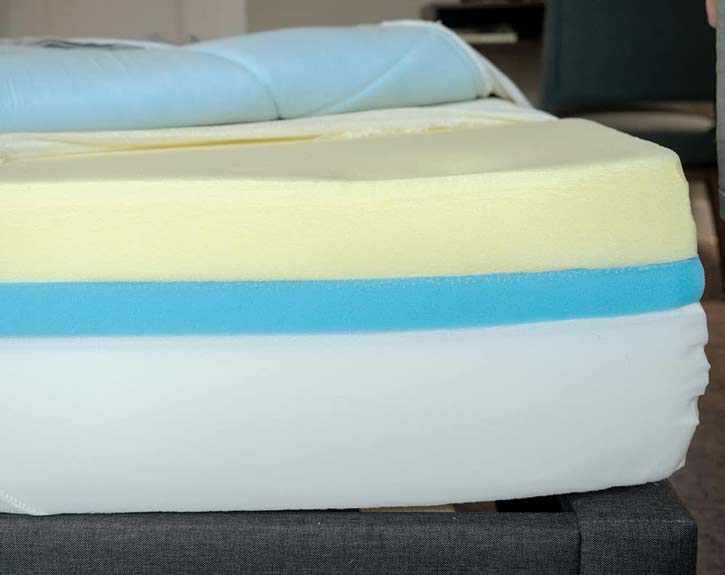
Support Layer
The Casper mattress has a layer of high-density base foam at the bottom, which offers lumbar support and makes the mattress more durable.
Nectar’s support layer is also made of high-density base foam, which helps support the spine and prevents the mattress from sagging.
Mattress Height
The Casper mattress is 11″ tall, and the Nectar mattress is 12″ tall.
Casper vs. Nectar Size Options and Price
For the most up-to-date pricing information, check out our charts below:
Casper
| Size | Dimensions | Price |
| Twin | 39″ x 75″ | $895.00 |
| Twin XL | 39″ x 80″ | $995.00 |
| Full | 53″ x 75″ | $1195.00 |
| Queen | 60″ x 80″ | $1295.00 |
| King | 76″ x 80″ | $1695.00 |
| California King | 72″ x 84″ | $1695.00 |
For more options, check out our Casper vs Loom & Leaf and Nectar vs DreamCloud mattress comparisons.
Nectar
| Size | Dimensions | Price |
| Twin | 38” x 75” | $1081.00 |
| Twin XL | 38” x 80” | $1148.00 |
| Full | 54” x 75” | $1498.00 |
| Queen | 60” x 80” | $1664.00 |
| King | 76” x 80” | $2131.00 |
| California King | 72” x 84” | $2131.00 |
You can also check for any current discounts or promotional offers for the Casper and Nectar mattresses by clicking on the coupons below.
Product
Firmness
Score

Product
Firmness
Score
Casper vs Nectar Performance Differences
We ran the Casper and Nectar mattresses through a number of tests to see how they performed in regards to cooling, motion transfer, and edge support. Let’s see how they did!
Sleeping Hot or Cold
The Casper and Nectar mattresses are both all-foam mattresses, so they’re not as breathable as most innerspring and hybrid beds. That said, they both feature cooling materials that help offset this issue. The Casper features AirScape technology which adds ventilation to the top of the mattress, and the Nectar features a cooling cover and a cooling gel infusion.
Between the two, the Casper mattress feels cooler than the Nectar mattress. The AirScape ventilation helped dissipate body heat and keep me cool throughout the night. The Nectar’s thick memory foam layer could make some people feel a bit stuffy.
If you want a Casper mattress that sleeps even cooler, consider the Casper Wave Hybrid Snow mattress.
Motion Transfer
Between the two mattresses, the Nectar handles motion transfer better than the Casper and is one of the best mattress for couples. It has memory foam right on top which is fantastic at isolating motion. Couples shouldn’t feel their partner’s movements come over to their sides of the bed.
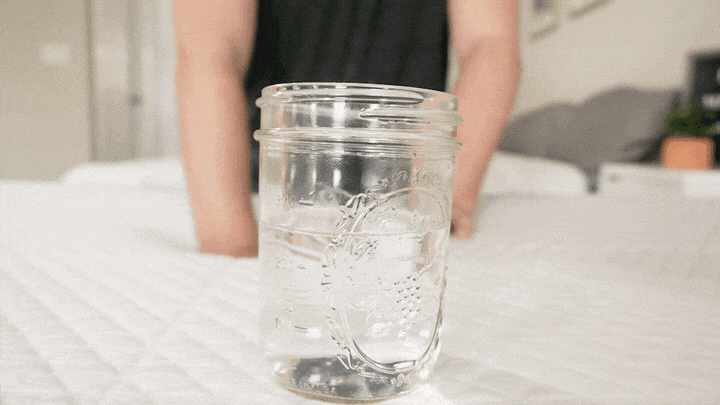
Edge Support
Even though they are both all-foam mattresses without coils, both the Casper and Nectar have good edge support. I felt secure while sitting and lying down near the edge of each mattress.
Durability
The Casper and Nectar mattresses are equal in terms of durability. They are both all-foam mattresses that feature high-density foams, so they should last for at least seven years.
Off-gassing
The Casper and Nectar are online mattresses that are delivered in cardboard boxes. When I opened them up and took off the plastic, I did notice an initial chemical smell. This is totally normal with bed in a box mattresses, so it’s nothing to worry about. We left the Casper and Nectar mattresses in a well-ventilated room, and the smell dissapeared after 48 hours.
Noise
When I moved around on the Casper and Nectar mattresses, I didn’t hear any noise. This is not surprising given that they do not contain coils.
Sex
Those who need a mattress for sex usually want a responsive mattress that’s easy to move around on. With this in mind, the Casper is a better option for sexual partners because it feels a bit bouncier than the Nectar.
Company Policies
It’s always a great idea to read the fine print when shopping for a mattress. Let’s go over the company details for Casper and Nectar.
Warranty Info
The Casper comes with a 10-year warranty, and the Nectar comes with a Forever, or Lifetime, mattress warranty.
Sleep Trial
The Casper comes with a 100-night sleep trial, and the Nectar comes with a 365-night sleep trial. This means that you can try out each bed for a few months, and if you decide it isn’t the right choice, you can return it and get a refund.
Return Policy
Both companies offer free shipping and returns. If the Casper doesn’t work for you, the company will pick it up from your home. Nectar asks that you use their mattress for 30 days before you decide to return.
Casper vs. Nectar Mattress FAQs
Now, we would like to answer some frequently asked questions about the Casper and Nectar mattresses:
What’s better, Casper or Nectar?
The Casper and Nectar are both excellent mattresses, but they are a better fit for different types of people. The Casper mattress is a better option for combination sleepers, larger back sleepers, and those who like a balanced foam feel. The Nectar is a good choice for couples, light and medium weight side sleepers, and those who like a memory foam feel.
Which mattress sleeps cooler, the Casper or Nectar?
Between the Casper and Nectar, the Casper sleeps a bit cooler. Casper’s AirScape foam is breathable and doesn’t trap body heat.
Which mattress is better for side sleepers, Casper or Nectar?
The majority of side sleepers will prefer the Nectar mattress. Its soft memory foam should relieve almost all pressure on the shoulders and hips.
Which mattress is more affordable, Casper or Nectar?
At regular price, both mattresses fall within the same price range. But with Mattress Clarity coupons, you can usually get the Nectar at a lower price.


